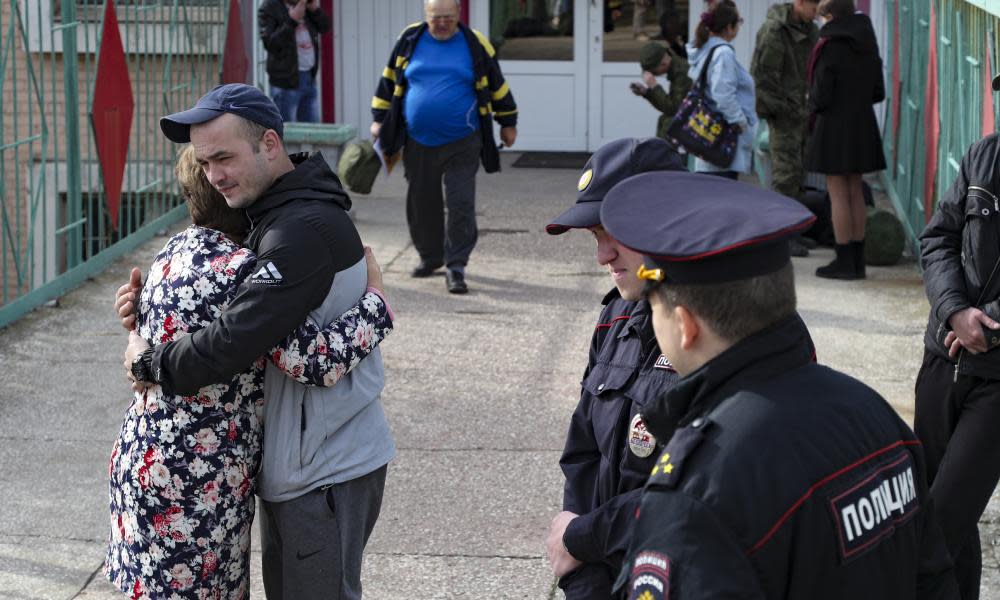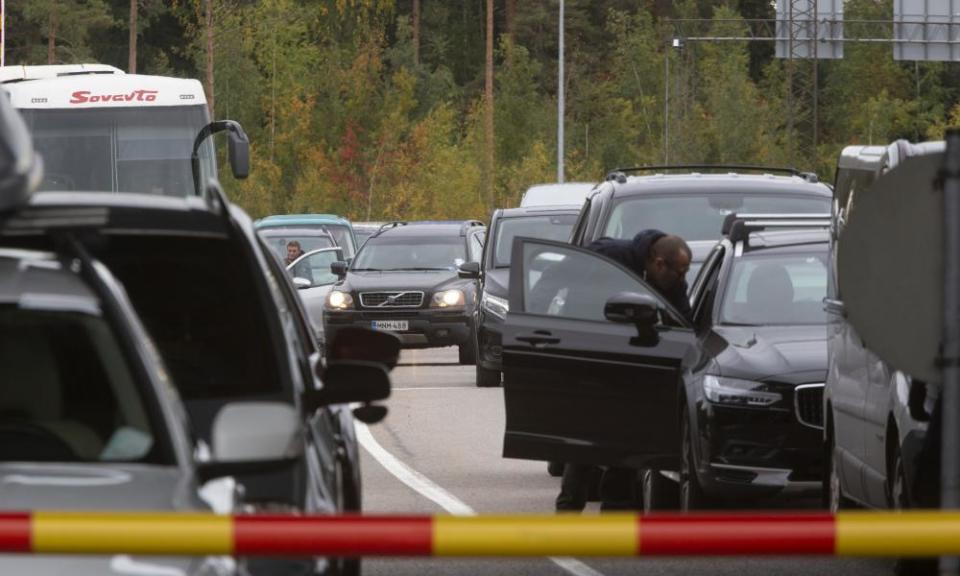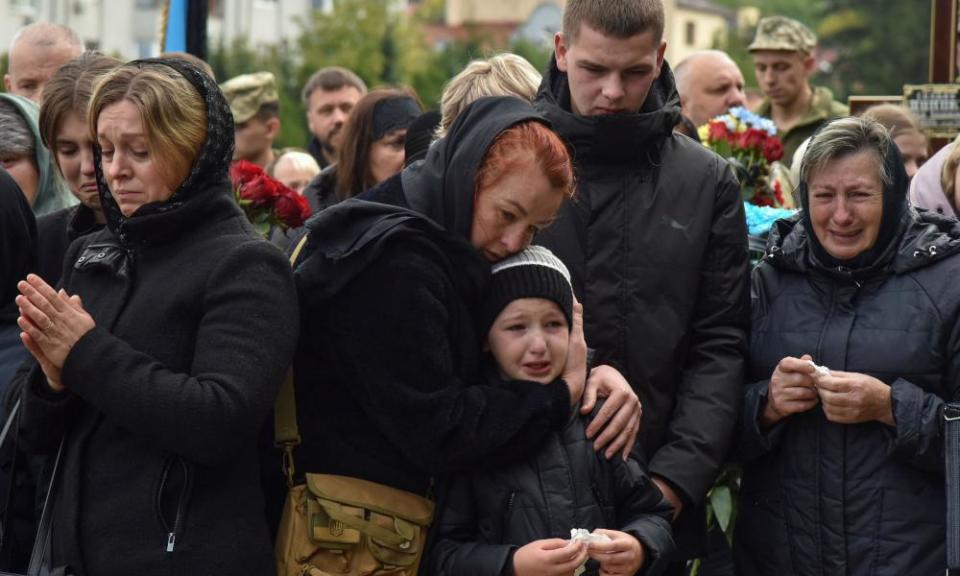Expect dissent to rise as Putin’s call-up brings Ukraine war home to Russians

In a caricature by the country’s most prominent political cartoonist, Sergey Elkin, Vladimir Putin is standing on top of the Kremlin wall with his arms outstretched.
“So what else do I need to do for you guys to finally start rebelling,” Putin asks, with a look of desperation.
As images showing thousands of Russian men getting into buses bound for training centres have started to appear, many in the west are asking the same question.
Putin’s decision to call the first mobilisation since the second world war has prompted widespread panic among Russia’s population but has not yet led to mass protests as experts predict that the effect of the call-up on public opinion will be gradual.
“Russian society has been repressed to the core and has become compliant,” said Andrei Kolesnikov, of the Carnegie Moscow Center thinktank, who has researched the country’s attitudes towards the conflict.
Kolesnikov said that much of Russia’s population has been forced into a “state of anticipatory obedience”, where a perceived inability to influence events encourages people to become passive.
But Kolesnikov’s research, published by the Carnegie Endowment for International Peace, also found that Russian public support for the war against Ukraine is less solid than statistics generally suggest, leading him to believe that Putin’s mobilisation order might prove to be a costly gamble.
“It could prove dangerous for the system to take the armchair warriors sitting in front of the TV and turn them into active participants,” he said. “We are already seeing the first signs of discontent now.”

On the eve of Putin’s address, hundreds of Muscovites gathered on the touristy Arbat Street to protest against the mobilisation. “No to war!” they chanted. Riot police and national guardsmen in camouflage quickly blocked off the street and began diving into the crowds to make arrests, many of those detained being young men.
During a tense standoff with police, another woman shouted: “We are not the criminals,” she yelled. “You are helping Putin send our fathers and brothers to death!” Police pointed to her and she was dragged away.
“I have been coming out [to protest] since the very beginning of the war,” said Irina, 32, an accountant. She said she had considered fleeing the country but ultimately decided to stay. “It’s important because I’m against the murder of people in a neighbouring country and that my people become murderers.”
More worryingly for the Kremlin, observers say, is the unrest that is starting to bubble up away from the big cities and in the regions, traditionally strongholds of the regime.
In a video from Kabardino-Balkaria, a small impoverished region in the Caucasus mountains, a group of women is seen berating a local officer for drafting their children. Their anger peaks when the official reveals that his own son isn’t eligible to fight.
At least three regional military recruitment offices have been attacked since Putin ordered the mobilisation. Moscow announced on Friday that it will send police officers to protect the employees of military enlistment offices.

Perhaps most strikingly, Chechnya, by far the country’s most repressive region, saw its first protest since the ruthless strongman Ramzan Kadyrov came to power 15 years ago, when a few dozen women gathered outside a mosque to voice anger about their sons being drafted.
In a post on his Telegram channel, Kadyrov hinted at the existence of the small protest by urging “our beloved mothers to stay calm”.
The Kremlin too was forced on Friday to comment on the growing panic in the country, saying that it doesn’t understand the continued “hysterical and highly emotional reaction” to Putin’s order to mobilise the population.
Many Russians have already voted with their feet, with the mobilisation leading to a surge in the number of men of military age leaving the country, likely sparking a new, and possibly unprecedented, brain drain in the coming days and weeks.
For now, the authorities are likely to further tighten the screws on those who have stayed behind. “No one will be able to hide, no one will be overlooked, everyone will be found,” one official told worried family members at a recruitment centre in the Siberian city of Omsk.
In another video from an unknown location in Russia, an officer is seen yelling at a group of mobilised men who were shown voicing their concerns about their conscription. “Shut your mouths and act accordingly … That’s it, playtime’s over. You’re soldiers now!”
Sam Greene, a professor of Russian politics at King’s College London and co-author of Putin v the People, said that with the call for mobilisation, Putin has “made the war a lot more real for people than it was before”.
“For many who were enthusiastic about the invasion, staying silent was still the preferred option, given the risks protesters face. But now, with the real possibility of being sent to the front, that calculus has changed.”
Greene further pointed to the data on Russians’ attitudes towards the war that suggested that the draft could hit hardest where support for the war is weakest: young men who have not openly opposed the war but who have been equally reluctant to support it.

“Russians look around for a sense of what the general consensus is and adjust their behaviour accordingly,” said Greene.
But if that consensus begins to change as many more young men die in Ukraine, Greene argued, then support for the war could move very quickly in the other direction.
“Putin has just increased the likelihood of protests breaking out,” Greene added.
Perhaps sensing the opportunity to tap into the discontent, Ukraine’s president Volodymyr Zelenskiy decided to address Russians directly in their native language in his nightly speech on Thursday.
“I will explain to the Russians what is happening in Russian,” he said, looking straight into the camera. “55,000 Russian soldiers died in this war in six months.
“Tens of thousands are wounded and maimed. Want more? No? Then protest. Fight back. Run away. Or surrender to Ukrainian captivity.
“These are the options for you to survive.”

 Yahoo Movies
Yahoo Movies 
